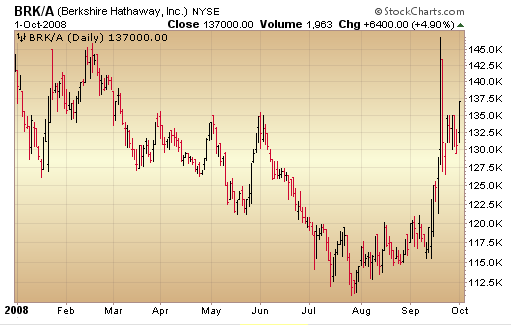According to Bloomberg and other sources around the web:
Buffett’s Berkshire Hathaway Inc. agreed to buy $3 billion in preferred shares that pay an annual 10 percent dividend and are callable after three years at a 10 percent premium. GE also said it will sell $12 billion in common stock, gathering more cash to fund operations.
Somehow, this is a new program/sales pitch to build confidence in the stock by showing that the world’s savviest investor bought into the company. This is clearly designed to entice investors as the company is looking to raise money through some kind of stock offering. Preferred stock offerings are the latest craze as they do not cause dilution and are seemingly expendable. Is that fair?
Maybe we should look at the sweetheart deal the Mr. Buffet received as a simple endorsement fee. (Goldman Sachs (GS) deal was similar in all regards). Is that fair?
Don’t be upset if you do not get the same seal on the GE share offering that Mr. Buffett received. Yours will not come with any guarantees or warrants. The shares that you buy will also have a yield far less than the 10% Mr. Buffett received. Is that fair?
Oh, by the way, have you looked at the performance of Berkshire Hathaway lately? The Bailout(s) of the financial sector have been very, very good to him! Is that fair?
Of course this comes only ONE day after General Electric (GE) was out saying that they did not need cash – which of course these days is a loud broadcast to the world that they really need money… quickly. Is that fair?
On October 1, Barron’s ran this:
GE DEFLECTS CHATTER ABOUT A CRISIS
Shares of General Electric (GE) have fallen 8%, pacing the decline in major market averages, as the conglomerate finds itself in the awkward position of defending its capital basis just a week after admitting that its quarter wasn‘t going to live up to expectations. Appearing to respond to market chatter suggesting that the debt markets might have shut down for its GE Capital operation, GE said that its commercial paper funding has gone smoothly, and has seen ”no disruption” to its funding. GE said it had no plans to draw down its bank lines as a means of replacing any dents in its access to the debt markets. Still, the cost of insuring GE debt against default swelled notably Wednesday, as the company‘s credit default swaps shot up 125 basis points, climbing to 740 basis points at its high for the day, according to Bloomberg. Meanwhile, Deutsche Bank lowered its earnings forecasts for the company, and said it expected earnings to decline in 2009 versus this year, because of the tightness in the capital markets and the shrinkage of some assets at its GE Capital operation. Deutsche said that, under its assumptions, GE looked expensive.

















